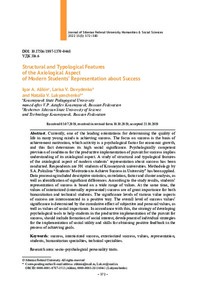Structural and Typological Features of the Axiological Aspect of Modern Students’ Representation about Success
Скачать файл:
URI (для ссылок/цитирований):
https://elib.sfu-kras.ru/handle/2311/128351Автор:
Alikin, Igor A.
Dovydenko, Larisa V.
Lukyanchenko, Natalia V.
Аликин, И.А.
Довыденко, Л.В.
Лукьянченко, Н.В.
Дата:
2019-12Журнал:
Журнал Сибирского федерального университета. Гуманитарные науки. Journal of Siberian Federal University. Humanities & Social Sciences; 2019Аннотация:
Currently, one of the leading orientations for determining the quality of life in many young minds is achieving success. The focus on success is the basis of achievement motivation, which activity is a psychological factor for economic growth, and this fact determines its high social significance. Psychologically competent provision of conditions for the productive implementation of pursuit for success implies understanding of its axiological aspect. A study of structural and typological features of the axiological aspect of modern students’ representation about success has been conducted. Respondents are 591 students of Krasnoyarsk universities. Methodology by S.A. Pakulina “Students’ Motivation
to Achieve Success in University” has been applied. Data processing included descriptive statistics, correlation, factor and cluster analysis, as well as identification of significant differences. According to the study results, students’ representation of success is based
on a wide range of values. At the same time, the values of interiorized (internally represented) success are of great importance for both humanitarian and technical students. The significance levels of various value aspects of success are interconnected in a positive way. The overall level of success values’ significance is determined by the cumulative effect of subjective and personal values, as well as values of social importance. In accordance with this, the strategy of developing psychological tools to help students in the productive implementation of the pursuit for success, should include formation of social interest, development of individual strategies for the implementation of social utility and skills for obtaining positive feedback in the process of achieving goals 31В настоящее время одним из ведущих ориентиров определения качества жизнедеятельности в сознании многих молодых людей выступает достижение успеха. Ориентация на успех лежит в основе мотивации достижения, активность которой является психологическим фактором экономического подъема, что определяет ее высокую общественную значимость. Психологически грамотное обеспечение условий продуктивной реализации стремления к успеху предполагает понимание его аксиологического аспекта. Было проведено исследование структурных и типологических особенностей аксиологического аспекта представления современных студентов об успехе. Респонденты – студенты красноярских вузов в количестве 591 человек. Использована методика С.А. Пакулиной «Мотивация достижения успеха студентов в вузе». Обработка данных включала описательную статистику, корреляционный, факторный и кластерный анализ, выявление достоверных различий. Результаты исследования показали, что представление студентов об успехе содержит в своей основе широкий диапазон ценностей. При этом большую значимость для студентов как гуманитарных, так и технических специальностей имеют ценности интериоризованного (внутренне представленного) успеха. Уровни значимости различных ценностных аспектов успеха взаимосвязаны положительным образом. Общий уровень значимости ценностей успеха задается совокупным действием субъективно-личностных ценностей и ценностей социальной значимости. В соответствии с этим стратегия разработки психологических средств помощи студентам в продуктивной реализации стремления к успеху должна включать формирование социального интереса, выработку индивидуальных стратегий реализации социальной полезности и навыков получения положительной обратной связи в процессе достижения поставленных целей
Коллекции:
Метаданные:
Показать полную информациюСвязанные материалы
Показаны похожие ресурсы по названию, автору или тематике.
-
Successive Approximation for the Inhomogeneous Burgers Equation
Mera, Azal; Stepanenko, Vitaly A.; Tarkhanov, Nikolai; Мера, Азал; Степаненко, Виталий А.; Тарханов, Николай (Сибирский федеральный университет. Siberian Federal University, 2018-08)The inhomogeneous Burgers equation is a simple form of the Navier-Stokes equations. From the analytical point of view, the inhomogeneous form is poorly studied, the complete analytical solution depending closely on the ... -
System of Methods, Techniques and Means as a Condition of Success for Vocational Training of Manager Personality
Panasenko, Galina V.; Shendel, Tatiana V.; Панасенко, Г.В.; Шендель, Т.В. (Сибирский федеральный университет. Siberian Federal University., 2014-10)The subject of this study is a systematic analysis of methods, techniques and means of retraining the manager personality. The problem indicated in the article, concerns the social order of society for training specialists ... -
Self-Control and Subjective Volitional Regulation as Personal Predictors of High School Students Success in the Framework of Career-Oriented Education in High School
Dementiy, Ludmila I.; Kupchenko, Victoria E.; Дементий, Л.И.; Купченко, В.Е. (Сибирский федеральный университет. Siberian Federal University., 2014-12)The article provides a theoretical overview of research reflecting correlation between intellectual factors, motivational and personality variables with high school students’ academic performance. This empirical research ... -
Nine successful Projects: why we Cannot Draw Lessons from our Own Experience
Lenskaya, Еlena A.; Ленская, Е.А. (Сибирский федеральный университет. Siberian Federal University., 2014-12)While Russian community is getting tired of never ending reforms that do not seem to lead to any positive consequences but are always implemented at a country-wide scale, a number of very successful regional or local ... -
SKILLS AND QUALITIES OF A SUCCESSFUL MANAGER
Малко, Е. В. (Сибирский федеральный университет, 2011)

